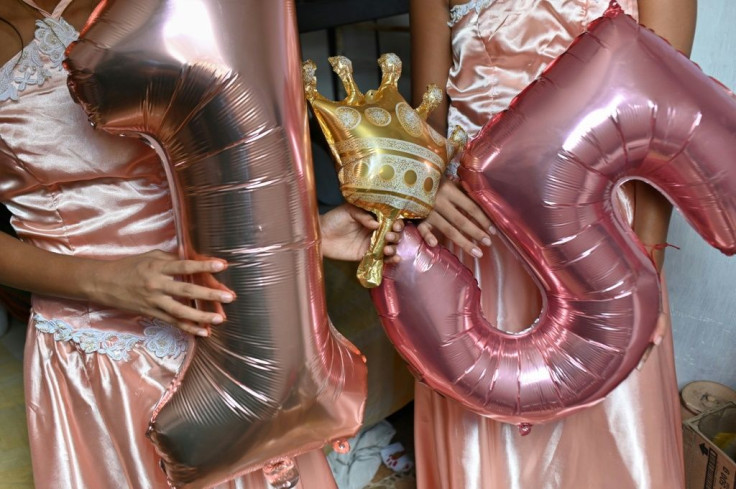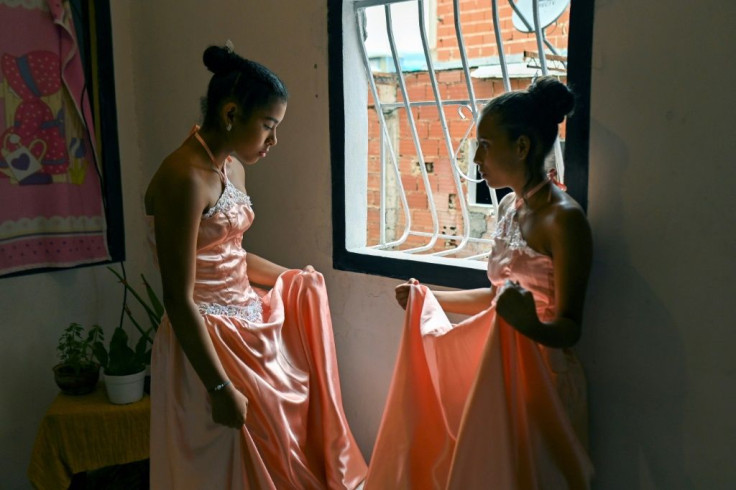Pandemic Scuppers Latin America Coming-of-age Quinceaneras
The coronavirus pandemic has robbed millions of Latin American teenage girls of their 15th birthday parties, a coming-of-age ritual that many had been planning for months and even years.
Some were planning huge lavish bashes, others more modest but equally exciting affairs -- but just as jobs, sports events, tourism, air travel and public works projects have ground to a halt, so too has this unique local custom, known as the "quinceanera."
Six months into the global pandemic and without concrete signs of an end in sight, girls are still crossing their fingers that 2021 might provide a chance for a belated quinceanera.

For some, the news that their party was off came in sudden and brutal fashion -- just days or even hours ahead of time.
"I felt terrible because it was a day before, but thankfully I was at school and my friends were there to support and console me, and also the teachers," Argentine teen Mia Minutillo told AFP as she carefully laid out the white dress she had hoped to wear for the occasion. Since mid-March, it has gathered dust in her wardrobe.
The white chiffon and satin gown embroidered with rhinestones fits a little loosely now, but Minutillo says there's time to have it adjusted before next March, when she hopes to be able to celebrate belatedly.

Her mother, though, gives a sober assessment of where such a disappointment stands in the greater scheme of things.
"It didn't happen to Mia, it didn't happen to her friend... it happened to the world, it happened to 15-year-olds the world over," said Veronica Rivero.
She's hopeful the celebration will take place once there's a vaccine or "if people are respectful" of the containment measures to prevent further spread of the virus.

The custom has its roots in the "coming out" balls of European aristocracy, where young women considered ready for marriage were presented to society.

Since it was exported to the New World, the tradition has also become popular amongst the working classes.
It's a testament to the importance of this celebration in the wider Latin American consciousness that even in a country like Venezuela, brutalized by an economic meltdown and the rampantly spreading pandemic, the family of Sidneidy Uray and her half-sister Yeikalin Gonzalez were determined to put on a party.
"Although it wasn't what we expected, it was truly unforgettable," said Uray, who was born on the same day as Gonzalez.

They wore identical peach satin dresses that were tailored 20 years earlier for Uray's mother Ildemira Valera and her sister.
"I wanted a bigger one that was a different color, but it wasn't possible. So I feel more than proud to wear my mother's dress," added Uray, choking back tears.
Families put a lot of time, effort and money into the celebration. Oftentimes, they begin saving when their daughters are still young children, or they rack up debts because the occasion merits "throwing the house out of the window."
Valeria Halit Carreno says she felt "a mix of bitterness and sadness" when her quinceanera was cancelled.
"I thought this year was going to be my year, I was going to be able to celebrate my quinceanera, I was going to have my big party," said the Panamanian teen.
Her mother, Yamileth Pastor, said her daughter "cried for many days, many nights."
But holding a party for 170 guests in the midst of a pandemic simply wasn't an option, and Carreno had to make do with a Zoom call with those closest to her.
She still got to dance the traditional waltz, albeit with her father and whilst wearing pajamas, she said, laughing.
In Mexico, Erendira Sanchez was confident the coronavirus wouldn't affect her plans, but instead, her flowing lace dress embroidered with flowers was never paired with a sparkling tiara.
"I feel something like nostalgia. Sometimes I feel a bit depressed because I say: won't it become ugly, won't it be ruined?" she says looking solemnly at her dress.
Her father, Eduardo Sanchez, says that despite the loss of money from the canceled event, the family will try again next year.
Even though things are "economically difficult," he says he's more concerned with "the dream she had."
"Young people from these generations are going through insecurity, they're living through the pandemic, they're going through very strong things," said Maria Zenaida Miranda, Sanchez's mother.
© Copyright AFP 2024. All rights reserved.





















